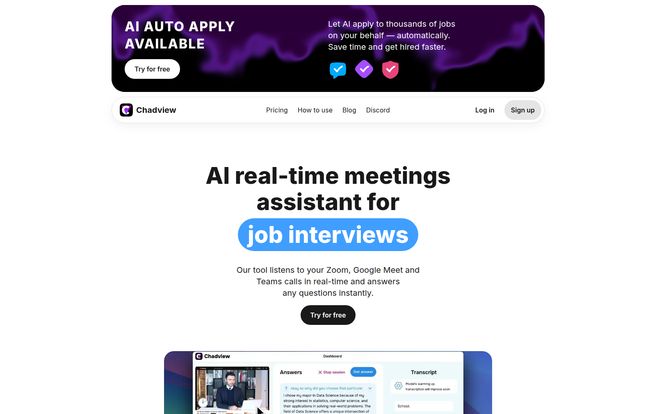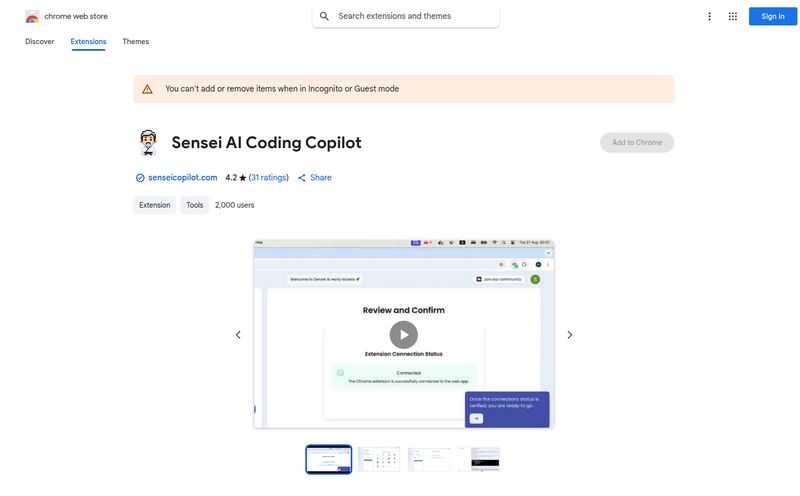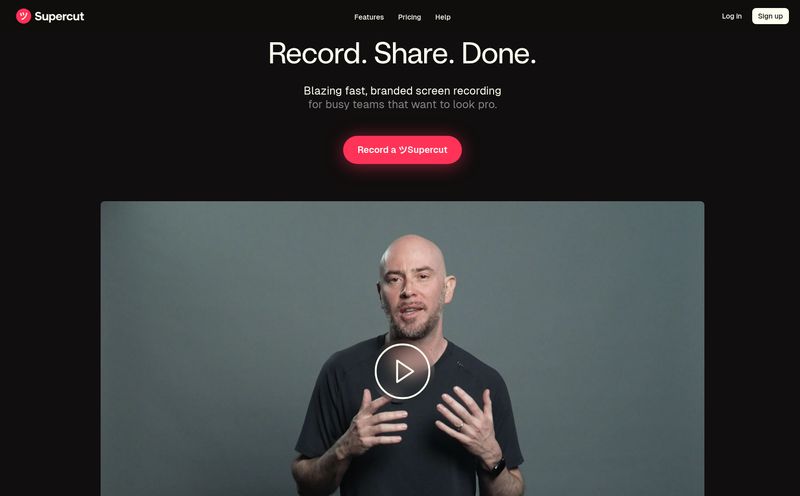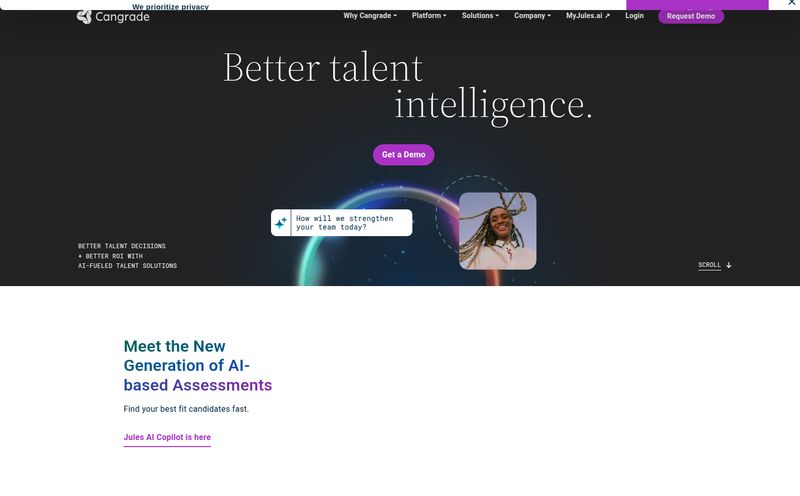Technical interviews can be brutal. You've got a panel of stone-faced engineers, a whiteboard that suddenly feels like the biggest, blankest space in the universe, and a question about binary search trees that makes your brain short-circuit. We’ve all been there. It’s a high-pressure performance that often feels more like a memory test than a measure of your actual, on-the-job skills.
For years, we've prepped with flashcards, mock interviews, and endless LeetCode grinds. But what if you had a secret weapon? A little birdy whispering the answers in your ear? Well, that's basically the promise of tools like Chadview. It's an AI-powered meeting assistant designed to be your co-pilot during those nerve-wracking online interviews. But is it a brilliant crutch, an ethical gray area, or just another piece of tech that overpromises and underdelivers? I decided to take a closer look.
So, What Exactly Is This Chadview Thing?
Think of Chadview as a digital Cyrano de Bergerac for your job interviews. It's a cloud-based tool that runs quietly in your browser during a video call. As the interviewer speaks, Chadview listens in, transcribes their questions in real-time, and then feeds that text to OpenAI's GPT-4. A moment later, a well-crafted, often scarily accurate, answer appears on your screen.
Your job? Just read the script. Sounds simple, right?
It’s designed to work with all the big players: Google Meet, Microsoft Teams, Zoom, you name it. Because it’s capturing audio directly from your browser tab, it doesn't need any clunky integrations or special permissions from the meeting host. It’s your own private, invisible assistant. A concept that is both thrilling and, let’s admit it, a little bit terrifying.

Visit Chadview
How It Actually Works Under the Hood
The magic is in its simplicity, at least from the user's end. The process is a neat three-step dance. First, it captures the audio from your browser. Second, its speech-to-text engine gets to work, creating a live transcript of the conversation. And this is the critical part—that transcript is immediately sent to a GPT-4 model fine-tuned for this kind of Q&A. The result is a suggested response that appears in the Chadview interface, ready for you to use. It's a continuous loop: they talk, it transcribes, AI thinks, you get an answer. All within seconds.
I’ve messed around with real-time transcription tools before, and they can be... finicky. But the idea of pairing it directly with GPT-4 for instant answer generation is a serious step up from just having a text record of your call.
The Standout Features I Noticed
Your Personal Interview Wingman
The main event, obviously, is the real-time response suggestion. This is especially potent for technical roles—the very area Chadview seems to be targeting. Stuck on a complex system design question? Blanking on the specifics of a particular algorithm? Instead of a panicked silence, you have a starting point. It's like having the world's smartest, fastest-thinking partner feeding you lines. The goal isn't to make you sound like a robot, but to give you that critical nudge when your brain freezes over.
Plays Well with Others
Compatibility is a big deal. The last thing you want is to find out your dream company uses a platform your fancy new tool doesn't support. Chadview dodges this by being platform-agnostic. As long as the interview is happening in your computer's browser, it can listen in. This covers the vast majority of online interview scenarios, from corporate giants using Microsoft Teams to scrappy startups on Google Meet.
Speaking Your Language
This was a pleasant surprise. It's not just an English-only tool. The platform supports multiple languages, including Spanish, Portuguese, Ukrainian, Russian, and Chinese. In our increasingly global tech industry, that's a genuinely thoughtful and useful feature. It opens up the tool for a much wider audience, which I have to give them credit for.
The Elephant in the Room: Is This Cheating?
Okay, let's talk about it. Is using a tool like Chadview in an interview cheating? Some would shout an immediate and resounding YES. And I get it. The interview is supposed to be a test of your knowledge, not your ability to read an AI's script.
But here's my take. The traditional interview process is already a bit broken. It often tests for rote memorization over problem-solving skills. On the actual job, would you be forbidden from looking something up on Google or consulting documentation? Of course not. You're expected to be resourceful.
I see Chadview less as a cheating device and more as a super-powered support tool. A crutch, maybe, but one that could help brilliant-but-anxious developers get past a broken hiring filter. You still need to understand the answer to deliver it convincingly and handle follow-up questions. If you just read it word-for-word like a robot, any good interviewer will spot it a mile away. So, is it a jetpack or a pair of water wings? I think it depends entirely on the person using it.
The Good, The Bad, and The Pricey
What I Liked
The sheer speed is impressive. The promise of near-instant answers isn't just marketing fluff. It’s also surprisingly easy to set up. There’s no complex software to install; it’s all browser-based. And the single, flat-rate pricing model is refreshingly straightforward. No confusing tiers or hidden fees. Plus, the easy cancellation policy is a nice touch of confidence from the developers.
Potential Hiccups
Of course, nothings perfect. The system’s effectiveness hinges entirely on the quality of its two core components: browser audio and transcription accuracy. If the interviewer has a thick accent or a bad microphone, the transcription might get garbled. Garbage in, garbage out. The AI can't answer a question it doesn't understand. I've seen even the best transcription services stumble, so it's a real point of potential failure you have to be aware of. It's not a magic bullet; it's a tool that relies on clear inputs.
The Cost of Confidence
So, what's the damage? Chadview runs on a simple subscription model: $15 per month. That gives you unlimited sessions on any platform, for any technical role, in any of the supported languages. There's a free trial, so you can take it for a spin before committing.
Is it worth it? I mean, think about it. If you’re a software engineer gunning for a six-figure job, is $15 a worthwhile investment to potentially nail the interview that lands you the offer? For a lot of people, that's a rounding error. It's less than a few fancy coffees. From that perspective, the value proposition seems pretty solid, assuming the tool delivers for you.
Bonus Feature: The AI Job Applier
Tucked away on their site is another interesting feature: an AI Auto Apply tool. The idea is that their AI can apply to thousands of jobs on your behalf, saving you time and hopefully getting you more interviews. While the main draw is definitely the interview assistant, this adds another layer of value to that $15 subscription. It turns Chadview from just an interview tool into a more comprehensive job-seeking platform.
Frequently Asked Questions
- Is Chadview detectable by the interviewer?
- Since it operates by capturing audio from your own browser and displays information only on your screen, it's designed to be undetectable. There's no software installed on the other end or anything that would alert the meeting platform.
- Does it work for non-technical interviews?
- While it's optimized for technical roles, the underlying GPT-4 technology is versatile. It could certainly help with behavioral questions or general knowledge, but its primary strength seems to be in providing specific, data-rich answers for tech fields.
- What happens if the transcription is wrong?
- This is the main risk. If the transcription is inaccurate, the AI will receive the wrong prompt and generate an irrelevant or incorrect answer. The user needs to be vigilant and use their own judgment, especially if the suggested answer seems way off base.
- Can I use Chadview on my phone?
- Based on its description as a browser-based tool that captures computer audio, it's highly unlikely to work on a mobile phone. It's designed for a desktop or laptop computer setup.
- Is there a free trial?
- Yes, the website prominently features a "Try for free" option, allowing you to test the service before paying for the monthly subscription.
- What languages does Chadview support?
- It supports English, Spanish, Portuguese, Ukrainian, Russian, and Chinese for both transcription and generating responses.
My Final Thoughts on Chadview
Chadview is a fascinating, powerful, and slightly controversial piece of tech. It’s a direct response to a pain point that millions of job seekers—especially in tech—feel acutely. It's not a replacement for actual knowledge and skill. You can't just be a puppet reading lines. But as a safety net? As a tool to break through anxiety-induced brain-freeze and get your thoughts flowing? I can absolutely see the appeal.
It represents a new frontier in how we interact with AI in our professional lives. It’s not just about automating tasks anymore; it’s about augmenting our own abilities in real-time. Whether that's a good or bad thing is a debate that's only just beginning. For now, Chadview is a tool that exists, and for $15, it might just be the edge someone needs to land their next big role. And in this market, who can blame them for seeking an edge?



